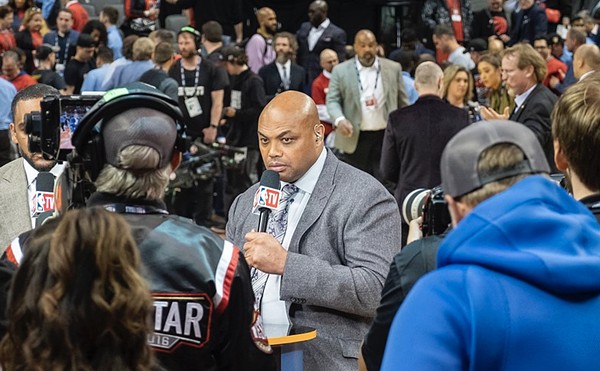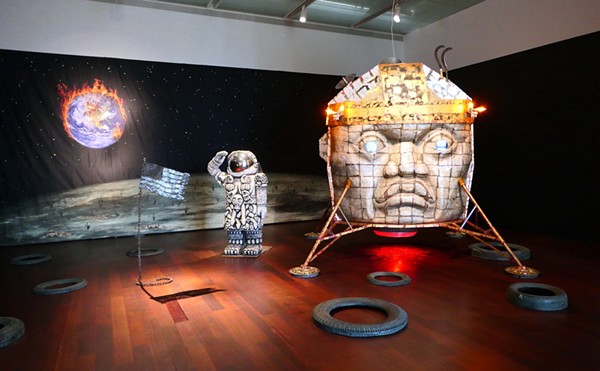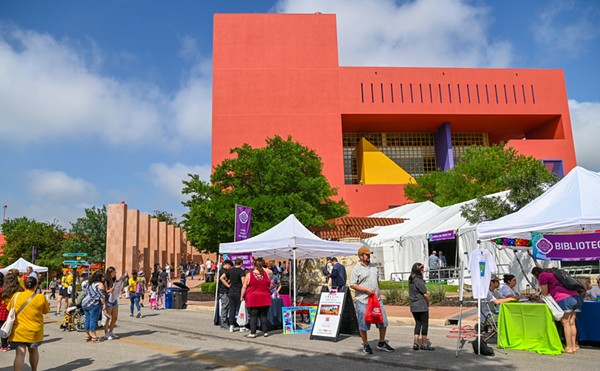Paul Bonin-Rodriguez told us that if we hadn’t already turned off our cell phones, it really wasn’t necessary.
It isn’t that type of show, is what the writer and star of the night’s first performance meant, and he was partially right. Jump-Start is debuting two plays this month in the Electric Performance Lab (EPL), a program that lets writers try out new works on live audiences who give real-time feedback. Because both Bonin-Rodriguez’s A Ranch Home in Manhattan and Monessa M. Esquivel’s m(dot)e(dot): a Life Experiment are so raw and fragile in their infancy, Saturday night’s audience was quick to laugh, eager to show the actors what they felt. The EPL creates a space in which both the viewer and writer gain the added freedom of interpretation without judgment. So Bonin-Rodriguez was correct — during this particular performance, old rules didn’t apply.
An introspective sequel to the playwright’s autobiographical Texas series, Ranch Home reintroduces Bonin-Rodriguez’s protagonist and alter ego, John Hobson. In the earlier stories, John grew confident in his sexuality, avoided his Texas roots, and led a glamorous lifestyle as a flight attendant. Now he’s back home, working in a small diner where the memories of his former life are thrust upon him.
We meet John (played by Bonin-Rodriguez) as he recites a review of his diner, Little Marie’s, in Texas Monthly. The restaurant critic liked everything but John, the diner’s “crusty owner.” A nostalgic and poetic tone overtakes the play as John sets the record straight for the audience: Had the food critic visited even one week earlier, he would have met an entirely different John Hobson.
Hobson takes his time resolving that mystery. First, he takes us back to a time before he first left his hometown, while he whips up cakes and pies like any professional multi-tasking chef.
Much of the show is spent in the past, but Bonin-Rodriguez chooses to narrate the memories instead of reenacting the flashbacks. The playwright’s language is elegant and charged with rich analogies, so it naturally suits Hobson’s self-exploration. But the tale would feel more natural as a short story than a play, and not only because Bonin-Rodriguez read from the script (which doubled as a recipe book) throughout the performance.
A Ranch Home in Manhattan is composed largely of John’s ruminations, making it difficult to describe the play’s events without spoiling the most important part: What exactly turned this nice Southern boy into Texas Monthly’s punching bag? The sentiments are heartfelt, the language clever, tender, and laugh-out-loud funny, skillfully walking that delicate line between humor and sobriety.
After a brief intermission, the mood turned sharply towards a world in which introspection is a scarier animal. Ruled by surrealism, suspense, and mystery, m(dot)e(dot): a Life Experiment is a multi-media drama centered on two characters: ME (the initials of its actress and writer/creator, but think of an Everywoman ‘me’) played by Monessa M. Esquivel, and YOU, a cryptic, pluralistic, omniscient, earth-mother goddess played by Roze.
Esquivel writes in a nutty vein, one of those maddeningly inscrutable yet seductive styles that forces the audience to relax and save analysis for a longer digestive process. A projector displayed an ancestral photo reel of migrant workers, farm hands, and laborers on a backdrop while speakers pumped in a heavy sonic texture. Then, a nightmarish event: On a dimly lit stage, ME frantically fights to get her bearings before a horrible accident occurs (no spoilers here).
In a time-space that’s unclear (Did they go back in time? Are they outside time entirely? Is it a cosmic do-over?) ME and YOU conduct various “life experiments,” or reenactments of life stages: a girl’s 5th birthday party, her embarrassment in junior high, a first transgression. This is all orchestrated by YOU, who invites the audience’s suspicion, but the mystery is well-plotted and juicy.
Special effects reign supreme in Esquivel’s ambitious m(dot)e(dot). The soundscape and soundtrack (which includes everything from Frank Sinatra to the Eels and Radiohead) were progressive and haunting; the photography slideshows occupied the stage like a mute character; a fly system and catwalk, let YOU transport to new corners for each scene and sent objects whizzing across Jump-Start’s mighty interior. m(dot)e(dot) even seamlessly integrates a short-film with stunning production, editing, and direction. This was in no way an indulgent, tangential addition; instead, it proved that Esquivel, director Steve Bailey, and videographer Sam Lerma cut no corners as they brought a vision to life.
If Bonin-Rodriguez used the EPL to explore which direction he should take with A Ranch Home, Monessa Esquivel used it to become more comfortable with … well, blowing people’s minds. Like Ranch Home, m(dot)e(dot) is laced with smart comedy that makes the audience forget the foreboding opening scenes. But we were too quick to get comfortable; the life experiments take a startling turn toward the explicit. After relishing the production’s tapestry of emotional and sensory stunts, specificity brought us down too hard, too fast. •
THEATER
A Ranch Home in Manhattan
m(dot)e(dot)
Through Mar 15
Jump-Start Performance Co.
(210) 227-5867
jump-start.org

















